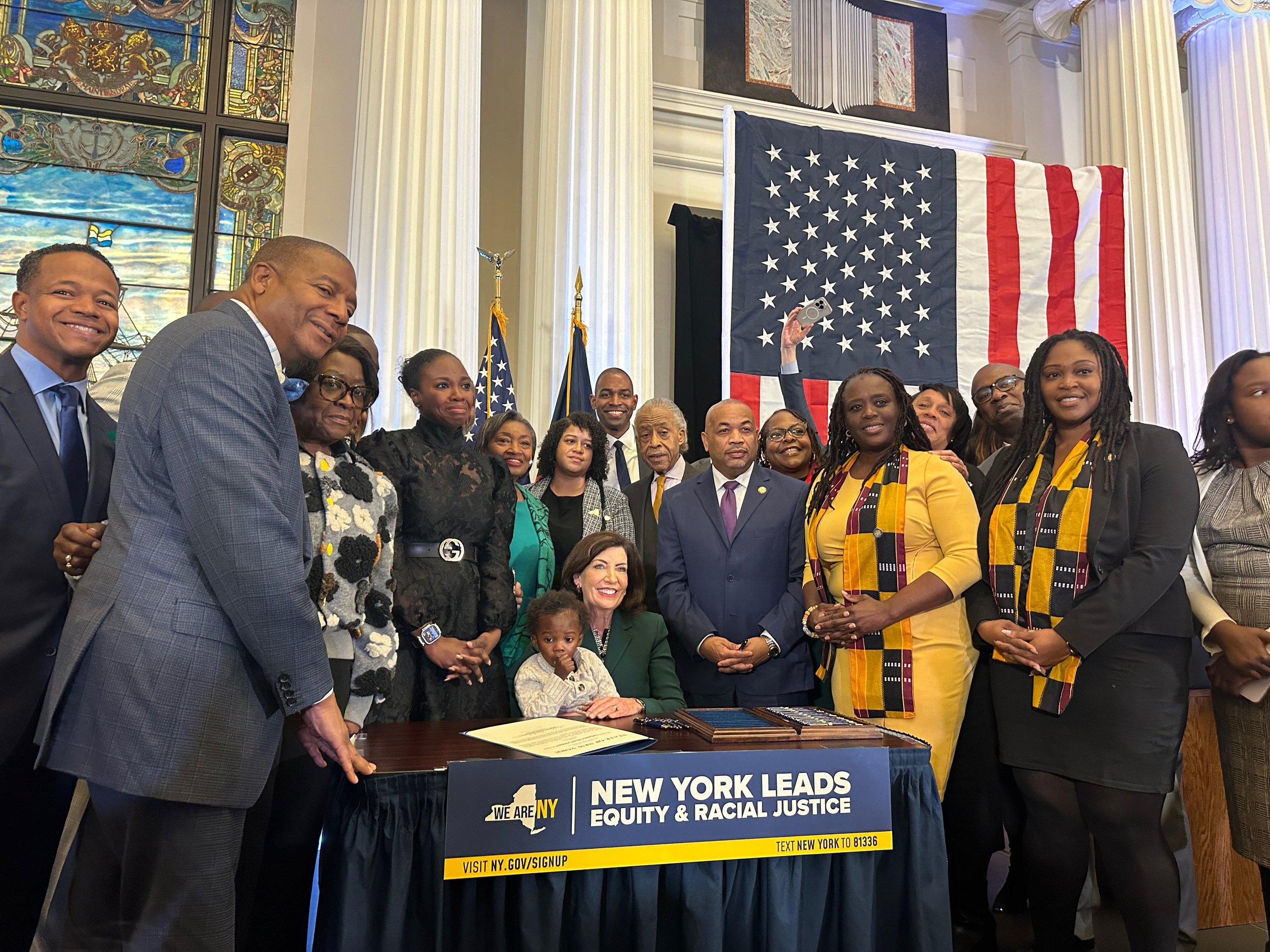CAUCUS CELEBRATES GOVERNOR HOCHUL SIGNING HISTORIC REPARATIONS & REMEDIES COMMISSION LEGISLATION
Caucus members gather as Governor Hochul signs the reparations legislation.
BPHA Caucus Chair & Reparations Bill Sponsor joins community advocates in calling for community unity and healing
View Chair’s full remarks here
NEW YORK, NY – As proclaimed by the United Nations General Assembly, the theme for the International Decade is “People of African descent: recognition, justice and development. Today, in that spirit, the New York State Black, Puerto Rican, Hispanic, and Asian Legislative Caucus – led by Assemblymember Michaelle C. Solages (D-Elmont) – commends Governor Hochul on the signing of the Reparations and Remedies Comunity Commission legislation.
The bill empowers the community commission to analyze the matter of reparations, as well as the legacy of de jure and de facto racial and economic discrimination against people of African descent. The commission will hold various hearings throughout New York State, hear from stakeholders, and then make recommendations to the legislature for any suggested remedies it deems proper for New York State to implement to respond to the injustices and wealth transfers caused by slavery and its legacies.
The “legislative intent” section of the bill recounts the history of slavery in New York, which is much more troubling and detailed than is commonly understood within New York, including the critical role of New York businesses in maintaining the slave system even after slavery was partially abolished within New York State in 1827. By some estimates, New York received 40% of U.S. cotton revenue through its financial firms, shipping businesses, and insurance companies. The wealth that was stolen through this system, and the role of these financial ties to today’s inequalities, will be further addressed by the commission.
According to Citigroup report on the Economic Costs of U.S. Racial Inequality, a plethora of data, studies, and societal ills indicate the U.S. has yet to achieve the point of racial equity, given the prevalence of major gaps in economic opportunity, education, income, housing, and wealth that run along racial fault lines. Furthermore, Citigroup estimates the economy would see a $5 trillion boost over the next five years if the U.S. were to tackle key areas of discrimination against African Americans.
Additionally, the New York City Comptroller released a report showing that white households in New York State have a median household net worth of $276,900, nearly 15 times greater than Black households with net household worth of $18,870. New York State has a wider racial wealth gap than in the United States as a whole, where the median white household net worth is $291,250 and the median Black household net worth is $31,370—a ratio of 9:3.
"In acknowledging New York's history, we confront the high cost of racial injustices. By Governor Hochul signing into effect the Reparations & Remedies Commission, New York State will empower communities to actively participate in shaping the essential path forward toward unity and healing. Reparations lay the groundwork for a future where all New Yorkers can thrive and prosper. I commend the Legislature, the Governor, and advocates for their collaborative efforts, I am proud to have sponsored this legislation and eager to continue advancing together in shaping our shared future.” stated Assemblywoman Michaelle C. Solages, Chair of the Black, Puerto Rican, Hispanic, and Asian Legislative Caucus.
The bill is part of a wave of efforts around the country to confront the lasting impact of institutional racism on Black families’ ability to achieve economic security and build wealth. In 2021, Evanston, Illinois became the first jurisdiction in the nation to pass a reparations law. To date, the city has disbursed over $1 million in reparations funds to Black residents impacted by the city’s history of racial discrimination. In California, a Task Force to Study and Develop Reparation Proposals for African Americans has released its final report to the state legislature and the public. Other efforts to study reparations emerged in cities like Detroit, Michigan; Amherst, Massachusetts; and St. Paul, Minnesota.
###
